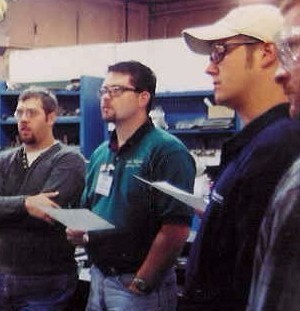What do most parents think about sending their kids off to technical school? What about having their son or daughter work in a factory or machine shop right out of
high school to gain experience, learn skills and earn money?
Let’s examine this.
What do most parents think about sending their kids off to technical school? What about having their son or daughter work in a factory or machine shop right out of high school to gain experience, learn skills and earn money? Let’s examine this.
“Let me tell you about my son, the CNC Operator!”

An August, 2015 Industry Week article reported a study of parents concerning their perceptions of manufacturing jobs as career tracks for their children. Alcoa Foundation’s Parents’ Perception of Manufacturing Survey, found that 89% of parents think that the average hourly wage for manufacturing jobs is between $7 and $22 an hour. Are you kidding? $7/hour is below minimum wage! The only experience most manufacturing employers have with “minimum wage” is hearing about it on the news. According to the same survey, “only 33% of parents associate manufacturing jobs with career advancement, and only 22% see the work as innovative and intellectually stimulating.”
We have a perception hurdle to overcome.
Let’s look at some obvious facts. If we in manufacturing want to keep our plants humming and our customers happy, we need great people. Now that the economy has gained more sustained footing, machine shops and manufacturing plants are clamoring for skilled workers and trained technicians. They’re willing compensate well. In reality, when you factor in benefits, the average annual compensation for American manufacturing employees equates to about $34.00 per hour. Starting hourly pay for skilled workers is generally in the neighborhood of $20/hour, with plenty of room for growth. When you add benefits on top of that, you’re ahead of many recent college graduates still searching for professional jobs in their chosen fields.
Where innovation and intellectual stimulation are concerned, the manufacturing sector is where most of the action is! Manufacturing plants are proving grounds for technological innovations. Manufactures have infrastructures already in place as platforms to innovate. They employ many of the engineers and even scientists who discover new and better ways of producing products vital to everything from modern convenience to better healthcare. They also have expertise in harnessing capital to build new production capacities in response to new and growing markets. That can open tremendous opportunities for career advancement.
When manufacturers fail to continue innovating and expanding their markets, they tend to stagnate and eventually fade away. That’s the last thing manufacturing executives want. Therefore, career growth and advancement opportunities abound for creative, ambitious young people who choose manufacturing vocations.

The major problem for most manufacturers isn’t getting enough business, it’s about finding and keeping trained, reliable and professional draftsmen, machinists, welders, and technicians to solve complex, precision fabrication challenges and optimize production efficiency. When we latch on to a conscientious & ambitious employee, we’ll do our best to keep that person on board for the long haul. That means providing benefits, good working conditions, and paying them well. For example, our starting pay for skilled workers is roughly $20/ hour with regular evaluations and merit raises. Then we add a generous benefits package with up to 4 weeks paid vacation. Employees who demonstrate that they lead a reasonably healthy lifestyle have their health insurance premium paid for by the company. We offer flex time and a four-day work week, as well as 3 personal days per year.
In terms of career advancement, the sky is the limit in manufacturing. Promotion from within makes a lot of sense for us. An ambitious person with intimate knowledge of internal operations can move more readily into sales, management and executive positions and hit the ground running. We see this happen all the time and it’s rewarding to watch people grow and thrive within your own company.
So our message today is this. Get the word out to parents, teachers, coaches and mentors that going to an Ivy League college, pursuing a law degree or getting through medical school is fine, but if your kids are looking for a fast track to a fulfilling career, manufacturing may be their best option.
What do you need to know?
Our goal is to bring informative and helpful ideas about metal work to our customers and the metal fabricating industries. Feel free to contact us and share your ideas.
(603) 889-2600
[email protected]

